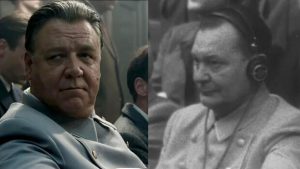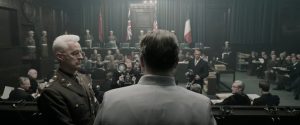Jonathan Bruce
READING TIME: 10 MINUTES
Legal dramas tend to be a tricky genre of film. They have to be engaging and well-structured in outlining a case or problem, examining the evidence, and determining whether the accused is guilty or innocent. Some legal dramas are very well done, such as Inherit The Wind, A Few Good Men, Witness For The Prosecution, The Trial of The Chicago 7, A Time To Kill, and Primal Fear. Others tend to be bogged down by the weight of the stories they’re trying to tell, and the result comes off as bloated, meandering, repetitive, and self-indulgent. However, there is one important question that must be answered: how can people continue to do horrible things while knowing what they’ve done?
Nuremberg is the latest entry in the legal drama category. Directed and written by James Vanderbilt (Zodiac) in his directorial debut, it is based on the true story of the primary Nuremberg Trials conducted in the wake of World War II. The plot is adapted from Jack El-Hai’s 2013 non-fiction book, The Nazi and the Psychiatrist. Specifically, the film examines the question of how to deal with war crimes: whether there is a collective responsibility; how human beings can commit atrocities; and whether such awful crimes could happen again. It also raises the issue of whether crimes of a huge magnitude can be properly punished.

Sony Pictures Classics
The film opens on May 7th, 1945, which is the last day of World War II. Adolf Hitler, Joseph Goebbels, and Heinrich Himmler are dead, and the succeeding Flensburg government has been dissolved. Amidst the stream of displaced, wandering Germans, Reichmarshall Hermann Göring (Russell Crowe) surrenders to a group of astonished American soldiers. He seems to consider himself a representative of Germany rather than a captive prisoner, even asking the soldiers to carry his luggage. In Washington D.C., Supreme Court Justice Robert H. Jackson (Michael Shannon) is informed about Göring’s arrest and plans for an upcoming International Military Tribunal to try the surviving Nazi leaders. Jackson wonders if such legal proceedings could be possible, because there has never been a precedent for crimes of this magnitude. He feels skeptical about the whole thing, and he’s even more uncertain when asked to lead the American prosecution. However, his secretary Elise Douglas (Wrenn Schmidt) urges him to reconsider by indicating that the war criminals could walk free if the tribunal is not done properly. Accepting the appointment is difficult for Jackson, because he hasn’t prosecuted a case in years and would have to take a leave of absence from the Supreme Court to do so. Nevertheless, he accepts the position and heads off to Germany. Jackson and co-prosecutor John Amen (Mark O’Brien) seek and gain approval from Pope Pius XII, who feels deeply guilty about his previous endorsement of Hitler back in 1933 (which was done as a way of protecting Roman Catholics in Germany). They have their support in British prosecutor Sir Maxwell Fyfe (Richard E. Grant), who’s adamant that they must show the world what Hitler and his band of thugs were capable of doing.
Psychiatrist Douglas Kelley (Rami Malek) is assigned to protect the prisoners’ mental health and keep them fit for trial. Upon arriving in Germany, he meets Colonel Burton Andrus (John Slattery), the commandant of Nuremberg Jail, and Sergeant Howie Triest (Leo Woodall), who serves as a translator for the prisoners. The other defendants include: Hitler’s former deputy Rudolf Hess (Andreas Pietschmann), who tried to stop the war with an unplanned flight to England in 1941; Robert Ley (Tom Keune); Admiral Karl Donitz (Peter Jordan), who ended up succeeding Hitler; and newspaper editor Julius Streicher (Dieter Riesele), who’s a fanatical anti-Semite and perverted human being. Upon their first meeting, Kelley sizes Göring up and determines the former Reichmarshall is much more intelligent than he lets on. Despite having a major addiction to morphine, he is charismatic, convinced of his own importance, narcissistic, and has a strong, imaginative capacity for self-delusion. Kelley also concludes that Göring understands English, a fact which is confirmed when helping him through a heart attack. After establishing a rapport, the two men settle into a cordial banter that borders on friendship. Kelley tries to keep things professional, but he becomes taken in by Göring’s jovial nature. He’s also seized with the notion of making his mark on the world by writing a book that exposes what the Nazis have done. As their sessions continue, Kelley becomes a confidant of sorts, and he forms a kind of friendship with Göring’s wife Emmy (Lotte Verbeek) and daughter Edda (Fleur Bremmer) when delivering letters to them. When off-duty, he strikes up a relationship with Lila (Lydia Peckham), a reporter for the Boston Globe who’s hoping to get an exclusive scoop on the defendants.
As the tribunal approaches, the situation becomes more tense when Ley has a nervous breakdown and strangles himself. To prevent the possibility of further suicides, Andrus posts 24-hour security on the prisoners and removes any projectiles from their cells. Kelley is fixated on Göring’s involvement in the formation of concentration camps. Göring maintains that he established them as labour camps, but denies they were meant for extermination, which he blames on the late Reinhard Heydrich and Heinrich Himmler. Kelley tries to get Göring to help with jogging the memory of Hess, who may or may not be feigning amnesia. Eventually, Andrus determines that Kelley’s objectivity is compromised and assigns Gustave Gilbert (Colin Hanks) to assist him. What’s more, Jackson fears the very real possibility that Göring and the other prisoners will use the trial as a platform to defend National Socialist ideology. Proving the defendants’ guilt will depend on the question of guilt and how much the defendants’ knew about what was going on.
It is Rami Malek who carries the movie as Douglas Kelley. The Mr. Robot actor has carved out a career for himself in various films, such as Bohemian Rhapsody, Little Things, No Time To Die, and Oppenheimer. His boyish features give off a calm, amiable presence, and his deep voice shows an intelligent actor who’s highly focused on his craft. Malek holds his own and carries the most dramatic scenes, which is most apparent in his verbal lashing of Göring and when expressing a sense of revulsion at the Nazis’ abhorrent actions. As the story progresses, he depicts a man who is confronted with crimes of a horrific nature and realizes that such actions can indeed happen again. While he doesn’t have any deep monologues or scene-chewing moments, Malek has a quiet strength that carries the plot as it ventures towards its somber, unsettling conclusion.

Sony Pictures Classics
Russell Crowe dominates the plot as Hermann Göring. Having shot to prominence nearly thirty years ago, the New Zealand actor establishes himself as a formidable leading man in old age. Crowe is bombastic and playful at times, but he also makes Göring out to be smug about his actions and full of his own (presumed) greatness. He has clearly put research into the role, because he speaks fluent German for the first twenty minutes of the film before switching to English. In one perplexing (and infuriating) moment, he even goes so far as to draw thinly-made comparisons between himself and Alexander the Great. One of the movie’s quieter scenes involves Göring recounting a childhood memory of his beloved mother having an affair with his wealthy godfather, while his father was being cuckolded and reduced to sleeping in a separate room. What’s not included in the film is the fact that Göring’s godfather was half-Jewish, which would have made for more depth and complexity in understanding how he could have committed horrible crimes against Jewish people at Hitler’s urging. Sadly, this is not mentioned or explored in depth.

Sony Pictures Classics
Michael Shannon gives Robert Jackson a welcome, dependable presence. The British actor shows a man who comprehends the burden of what he has to do, and it makes him all the more relatable. Shannon makes the character driven and articulate, yet conflicted about his job. Despite his seemingly assuredness, he remains uncertain about what actions must be taken in dispensing justice to the defendants. It is quite dramatic to watch him spar off against Crowe during the climactic court scenes, and one cannot help but worry for him. His performance showcases why he’s one of the hardest-working actors in today’s business.
The rest of the cast does well in their roles. Richard E. Grant (Saltburn) plays the steely, resolute Sir Maxwell Fyfe with an air of confidence, and he serves as a voice of reason to Jackson. His self-assured nature provides a welcome turn as he takes Göring to task on the witness stand. If anything, Grant demonstrates his talent and proves how good of a character actor he is. John Slattery (Mad Men, Spotlight) plays Colonel Andrus with a strict, brusque demeanour and a rigid adherence to protocol. While he might seem like a stereotypical military cliché, Slattery gives Andrus depth by wanting to prevent the prisoners from attempting suicide, and he also shows an increased disgust with what they have done to millions of victims. His hilarious moment comes when chastising Kelley and Gilbert for squabbling in a petty engagement: he barks, “For Christ’s sake, you’re mental health professionals!”. Wrenn Schmidt brings a calm sense of logic to Elsie Douglas, as well as a good sounding board for Jackson’s misgivings about the tribunals. Although he doesn’t have much depth, Dieter Riesele brings an odious presence to Julius Streicher, and it makes one uncomfortable with how creepy he comes across onscreen. His third-act breakdown and copious weeping is difficult to watch, but it should be remembered that Streicher was a loathsome human being who willingly participated in the murder of Jewish people and others deemed by Hitler as undesirable. Andreas Pietschmann and Peter Jordan appear as Rudolf Hess and Karl Donitz, respectively, but neither are given a lot of screen time to flesh out their characters and motivations.
Out of all the cast, it is Leo Woodall who delivers a deeply moving performance as Sergeant Howie Triest. Initially depicted as a guard and translator, he gives off the feeling that he’s got deeper reasons for being there. Ultimately, the truth is revealed when Woodall has a heart-wrenching monologue in the third act, showing what it means to see human beings be cruel to each other. The young man proves himself capable of carrying a scene, and it’s clear he is set for a long acting career.
Perhaps the most jarring moment in the movie is a six minute sequence of the tribunal screening a documentary film about Nazi concentration camps. Apart from narration within the documentary, the majority of said scene plays out in silence. Many people are shown to be visibly affected by the footage, including Kelley (who has to excuse himself and leave the room). Yet the most disquieting reactions are from Göring and the defendants, who project a dismissive or indifferent attitude toward the footage. Even more infuriating, Göring later scoffs at the legitimacy of the concentration camp evidence and suggests it must have been faked. This is especially relevant in today’s world, because anti-Semitism and historical revisionism are still strong among modern society.

Sony Pictures Classics
Vanderbilt proves himself to be a capable director in keeping the action focused on the buildup to court while also depicting the trial itself. Legal dramas are a hard sell for modern audiences, given that the bulk of the plot occurs within a courtroom. To prevent this, Vanderbilt intercuts between the prisoners’ confinement in Nuremberg and the prosecution’s feverish work within the Palace of Justice. Having experience as a screenwriter, he understands human behaviour and aims to focus on what makes the characters tick. The focus on Kelley and Göring’s interactions is fascinating, and viewers might even find themselves drawn to the latter before remembering what he did to millions of people.
Nuremberg is a well-made, well-crafted movie in its own right. Director of photography Dariusz Wolski uses a cinema verite type approach in filming the conversations between defendants and their interrogators. He also employs wide panoramic shots of the courtroom to display the scope of the trial being staged. One of his more fascinating methods is filming the defendants in black-and-white documentary mode, so as to simulate vintage newsreel footage. Tom Eagles’ editorial work keeps the film moving at a taut, brisk pace, and the end result doesn’t feel lagging or overlong. Brian Tyler’s layered, underlying score feels appropriately subtle and somber, which fits the mood of the film.
As par for the course in Hollywood, there is some artistic license taken with the story. For instance, the character of Lila did not exist, since her character is a composite of journalists trying to get a scoop on the trial and grappling with the truth of what crimes the Nazis have committed. Obviously, the affair she and Kelley have was completely fictional, since the psychiatrist never blabbed about his dealings with Göring and the other defendants. While it is true that Jackson was shaky in his cross-examination of Göring on the witness stand, Maxwell Fyfe stepping in to pick up the pieces only happened on the following day and not immediately after the American prosecutor’s questioning. In addition, the film depicts Kelley being sceptical about Rudolf Hess’s supposed amnesia being real, whereas the historical record indicates it may indeed have been genuine. While Kelley views Emmy Göring as a sympathetic woman caught up in her husband’s infamous reputation, the narrative does not depict her efforts at trying to retain artwork that was stolen from Jewish owners. It is frustrating that these complexities are not depicted, because they could have shown how various Germans felt and responded during the time of Hitler’s years in power.
One disappointing element is the amount of material that the film leaves out entirely. Several other Nazi defendants were prominent figures in the Nuremberg Trials, such as Foreign Affairs Minister Joachim von Ribbentrop (who helped Hitler plot and carry out atrocities), Field Marshal Wilhelm Keitel and General Alfred Jodl (who both waged aggressive warfare), and Minister of Armaments Albert Speer, who helped lay the groundwork for the concentration camps. These men all pleaded not guilty, yet they either used the “acting on higher orders” defence or deliberately tried to downplay their own involvement. This especially rings true with Speer, who took accountability for his role in Nazi Germany, yet further evidence suggests that he really knew a lot more than what he let on. Ribbentrop stubbornly denied his own involvement and even went so far as to not acknowledge his signature on documents entered into evidence. Although they appear in the prisoners’ dock and are listed in the credits, they do not get dialogue or moments to shine within the narrative. Granted, if they were included, the length of the movie would be substantially longer.
Nor does the film explore the question of what actions the Russians committed during World War II, because that would be a whole story in itself. In real life, the Russians were also prosecuting the Nazi leaders, and the defendants’ lawyers were warned in advance that any attempts to implicate the Soviet Union would be forbidden. On a more personal level, the film omits the defendants’ attempts at manipulating sympathy from their jailers and interrogators. Furthermore, Göring’s trust in Kelley went much further in real life, to the point where he asked the psychiatrist to adopt his daughter Edda and raise her in America, because he felt Germany would not be kind to the children of surviving Nazis. Ultimately, this did not come to pass, but it raises the question of how far a professional can become too involved with their subjects.

Sony Pictures Classics
Overall, Nuremberg is a solid, engaging film. Crowe, Malek, Shannon, Slattery, Grant, and Woodall give excellent performances. Vanderbilt’s direction and writing are both top-notch. This could very well be one of 2025’s best dramatic works. Three and a half out of four stars.



